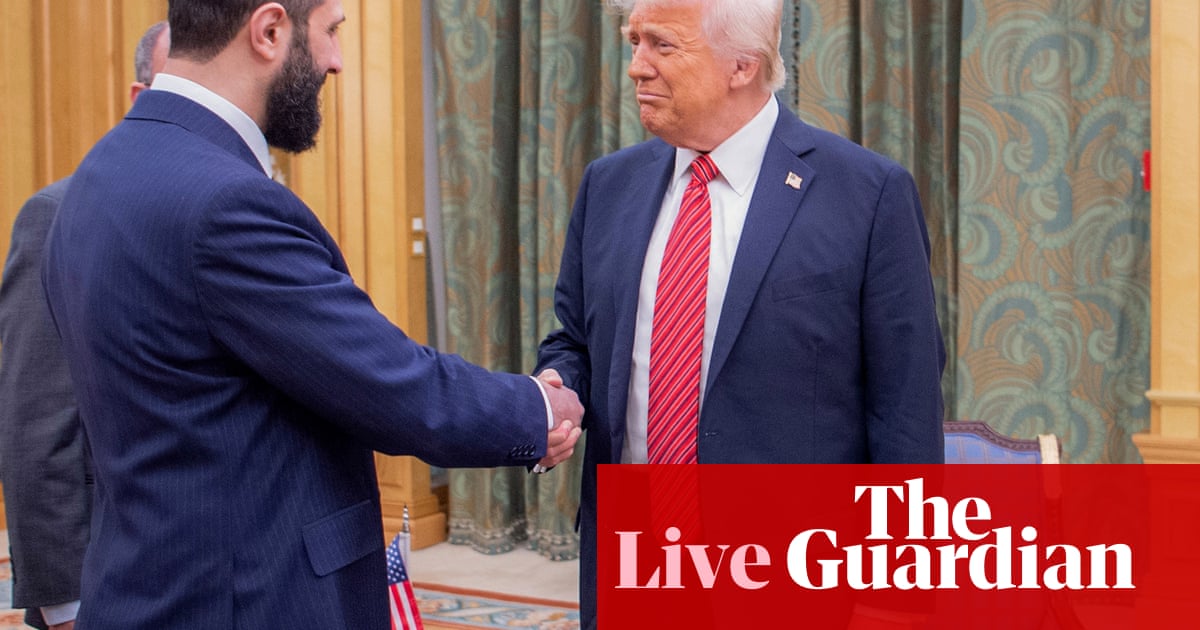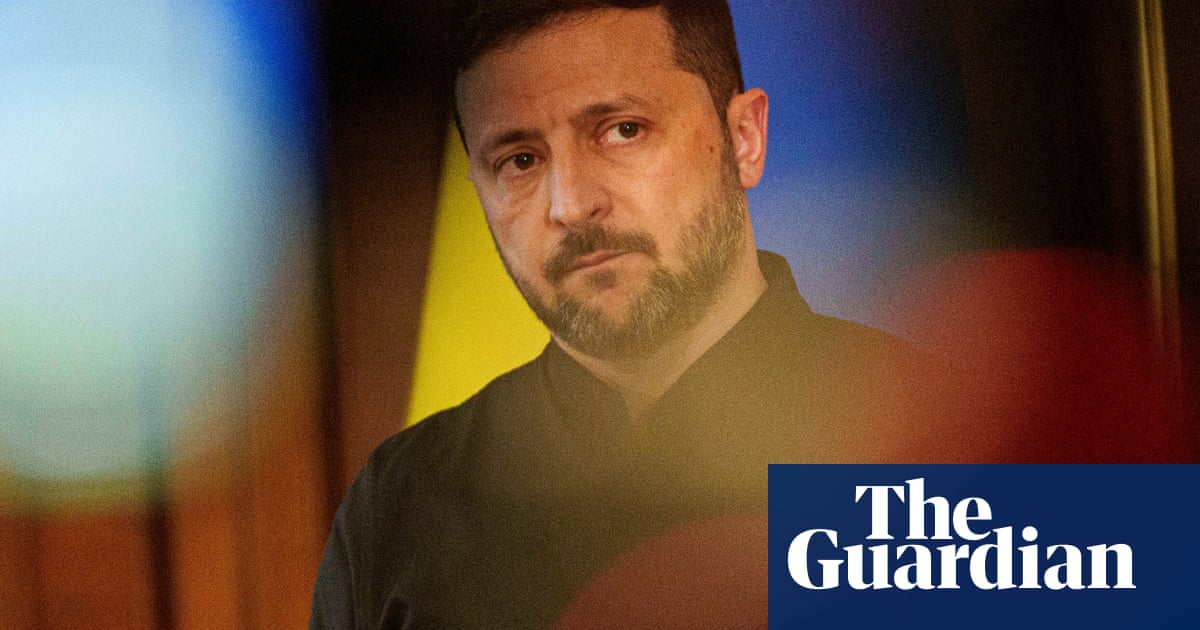The White House’s message to non-citizens in the US in recent weeks has been clear. No matter how long they have lived in the country or what life-threatening conditions await them at home, if the Trump administration thinks they don’t belong here then they don’t deserve an opportunity to meaningfully defend themselves before being detained and expelled, many loaded on to planes and, in some of the most extreme cases, essentially disappeared.
Donald Trump is undermining the fundamental right to due process from several directions, whether by intimidating law firms, defying and threatening judges, or attempting to defund children’s attorneys. The aim appears to be to cut off immigrants’ access to legal representation, while the effect is to erode their civil liberties.
The end result is that it’s easier to deport people – and along the way the streamlining also makes it more likely that miscalculations will occur that separate families or return victims to their persecutors – or both.
One US circuit judge was particularly blunt when she said that “Nazis got better treatment” while facing repatriation during the second world war, compared with hundreds of Venezuelans who were recently sent to El Salvador’s infamous maximum-security prison, many without even a court hearing.
In other legally dubious moves, Trump has ended the right to seek asylum at the US-Mexico border, despite it still being enshrined in law. His subordinates have paused processing green cards for refugees, asylum seekers and some Cubans, even though they qualify. The administration has sent migrants, many of whom have no criminal record, from US soil offshore to Guantánamo Bay, where detainees say they have been shackled and beaten by American officers.
And amid all of these actions undermining the rule of law – not to mention human dignity – the Trump administration has systematically attacked any check on its power from lawyers or judges, who often embody the last line of defense against wrongful detention and deportation.
Trump’s most explicit attempt yet to control the immigration bar came on 22 March. In a public-facing memorandum to the US attorney general, Pam Bondi, and the homeland security secretary, Kristi Noem, he decried what he called attorneys’ and law firms’ “unscrupulous behavior” and went so far as to allege that lawyers “frequently coach clients to conceal their past or lie about their circumstances when asserting their asylum claims” in order to “deceive the immigration authorities and courts into granting them undeserved relief”.
Then, to punish his adversaries for what he described as “frivolous, unreasonable and vexatious litigation”, Trump asked Bondi to pursue sanctions against attorneys, directed both her and Noem to prioritize enforcing attorney discipline, and threatened to revoke lawyers’ and their firms’ security clearances and federal contracts.
Again, his message was clear: attorneys who work on legal challenges that he doesn’t like – sometimes by simply defending their clients to the best of their ability – will face potential retribution that could seriously affect if not altogether doom their legal practice.
The American Immigration Lawyers Association (AILA), a 16,000-plus-member organization for immigration attorneys, called the memo “chilling, “unfounded” and “dangerous”. Still, the group’s president, Kelli Stump, responded defiantly, saying that the “AILA and its members will not be intimidated”.
Unlike criminal defendants, non-citizens don’t have a right to counsel in immigration court. So when they are unable to find an attorney on their own, even the most egregious mistreatment often goes unchecked, while textbook cases for legal relief get denied or are never filed. That’s part of why so many law firms have made immigration a pro bono priority in recent years, understanding that most migrants and asylum seekers can’t afford a private attorney.
Yet even before Trump’s 22 March memo, many firms that had invested a great deal of time and resources into representing immigrants for free during the first Trump administration had fallen silent about their plans to fight against the current immigration crackdown.
In fact, one of the firms that was loudest about its immigration pro bono work during Trump’s first term, Paul, Weiss, has now caved to a number of general demands from Trump to avoid a legal battle that could have affected business. Unsurprisingly, when asked by the American Lawyer magazine about how the firm would defend immigrants over the next four years, Paul, Weiss stayed quiet.
As Trump continues to target other law firms, asking for concessions and threatening executive action, immigration advocates worry the 22 March memo will further discourage attorneys concerned for their own safety from taking cases. That, in turn, could make it even more difficult for people facing deportation to find legal representation.
This matters a great deal: research suggests that detainees in immigration custody – now at the highest level since 2019 – are 10.5 times more likely to have a positive outcome if they are represented by an attorney. Likewise, the grant rate for asylum or other legal relief for unrepresented people is a dismal 19%, but that increases significantly to 47% in represented cases.
Some of those disparities could be attributed to the fact that even pro bono attorneys may screen out the weakest cases and gravitate towards the strongest. But there’s still no denying that having representation changes the calculus for those in immigration proceedings.
after newsletter promotion
Perhaps the most extreme example of immigrants in need of legal counsel are the children who come to the US alone, who cannot reasonably defend themselves in court. Among these unaccompanied kids, past data indicates that those who had an attorney were more than seven times more likely to be able to stay legally in the country compared with those who didn’t.
And yet the Trump administration is trying to largely terminate a federally funded program that provides attorneys for more than 26,000 unaccompanied children – some of them infants or toddlers – reportedly citing “the government’s convenience” to justify its decision.
Affected organizations have won a temporary restraining order restoring the status quo for the program after suing the administration. But their victory may only prove temporary, and one expert warned “we have to be prepared for the worst, which is children going to court without attorneys all over the country” while expert government lawyers argue for their deportation.
At the same time, other court activity involving immigration has propelled concerns about a potential constitutional crisis, given that the executive branch is seemingly ignoring judicial orders left and right.
In the most high-profile case, the Trump administration carried out removal flights of Venezuelans to El Salvador despite a judge ordering them stopped, and then federal authorities refused to comply with the judge’s request for more information. As for Trump, he called for the judge’s impeachment and described him as a “Radical Left Lunatic”.
The US supreme court earlier this week unanimously upheld the constitutional right to habeas corpus, a crucial pillar of due process, in that case – but removed the temporary block on Trump using an aged wartime law to justify those fast-tracked expulsions, in a split emergency ruling. Since then, court decisions in Texas and New York have continued to challenge the idea that people can be sent away to a potential lifetime prison term without a chance to argue their case.
In another lawsuit, a Brown University professor was hastily deported, despite an order requiring the Trump administration to provide the federal district judge overseeing her case at least 48 hours’ notice before removing her. And in yet another, when a judge ordered the restart of the US’s refugee resettlement program, officials sabotaged their ability to comply by revoking agreements with the agencies responsible for resettling refugees. Then, for a month, the officials seemingly stalled until receiving a more favorable ruling from a higher court.
All of this is to say that what may seem like disconnected cases and separate issues are actually all elements of a wholesale attack on due process.
Trump seeks the impunity he’s been waiting for to be able to do nearly whatever he wants with vulnerable immigrants. Who’s able to get in his way and who can’t – or won’t – is now testing what the United States stands for every day.

 German (DE)
German (DE)  English (US)
English (US)  Spanish (ES)
Spanish (ES)  French (FR)
French (FR)  Hindi (IN)
Hindi (IN)  Italian (IT)
Italian (IT)  Russian (RU)
Russian (RU)  1 month ago
1 month ago
























Comments